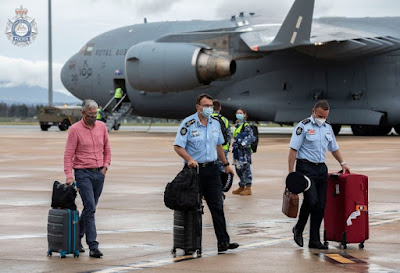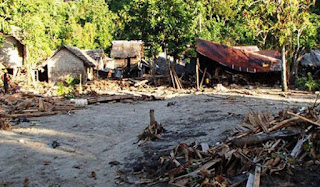Keeping the Pacific watch
22 April 2016, FFA HQ SOLOMON ISLANDS – Building on recent firsts in previous fisheries surveillance operations, Operation Rai Balang 16 saw the successful surveillance and apprehension of three Vietnamese ‘blue boats’ poaching for reef resources in the EEZs of FSM and Palau.
Thanking the participating nations as the ten-day Operation ended this week, FFA’s Director General James Movick says, "it is this efficient coordination of aerial and surface assets that gives such strength to surveillance operations like Rai Balang, and contributes to the ability of the Pacific to manage and enforce their fisheries with the benefits being seen in the improved compliance trend across the region.”
OPRB16 encompassed the EEZs of the seven participating FFA members and the associated high seas, a total area of 12.3 million sq. km. The 19 member command team based at the Regional Fisheries Surveillance Centre at FFA headquarters in Honiara comprised officers from the FFA secretariat, Australian Fisheries Management Authority, Royal Australian Air Force, US National Oceanic and Atmospheric Administration and the US Coast Guard. Tonga HMAF Maritime Force officer, Sub-Lieutenant Robert Hala’eua, was Chief of Staff for the operation while watch keepers attended from FSM, RMI, Palau, Nauru, Kiribati and Vanuatu.
“The participation by visiting watchers to Rai Balang from our participating member countries, in particular that of SBLT Hala’eua has been excellent,” says FFA RFSC team leader RNZAF Squadron Leader Ron Logan.
At the operational end, OPRB16 involved the deployment of 25 people working in the various national maritime, police and fisheries headquarters across the region, more than 50 aircraft crew and over 400 operational personnel who undertook 60 boardings at sea and in harbour, with two infringement notices issued — two from the patrol boat REMELIIK, and one from the patrol boat MICRONESIA.
“OPRB16 was able to mobilize six aircraft supplied by the QUAD Defence partners, Australia, New Zealand, France and the USA, flying a total of 130 hours of surveillance covering 2,150,000 square kilometres with 714 vessel sightings. Through the RFSC these aircraft worked in a coordinated fashion with one French patrol boat from New Caledonia and seven patrol boats from FSM, RMI, Solomon Islands and Palau deployed for closer monitoring and apprehension,” says Squadron Leader Logan.
Of enormous importance was the detection and arrest of three illegal vessels that are charged with poaching in the waters of Palau (2) and FSM (1). These are the latest in a long string of small wooden vessels from Vietnam that have been arrested in FSM, Palau and even Australia. These vessels are known to fish for coral reef species such as sea cucumbers, giant clam and shark fin, all of which are economically, socially and culturally important to island communities.
“It is clear that these so called “blue boats” are a growing new risk for illegal fishing in the western Pacific” said DG Movick. “While these boats are not targeting tuna and their hold capacities are very limited, they are stealing important reef resources and their incursions are an affront to our sovereignty. They are a particular concern because they are small wooden vessels that are not easily detected by our day to day activities and the traditional tools that we have built around the industrialised tuna fishery. It is very encouraging that OPRB16 successfully enabled Palau and FSM to detect and seize these vessels. In Palau in particular, it is heartening that the vessels were detected by a civilian aircraft chartered for the Operation, which was then able to guide the Palau Patrol Boat PRESIDENT H.I. REMELIIIK to the boats spotted.”
“Moving forward, this new form of threat will require us to evolve tools and practices crafted to local conditions. Aerial surveillance will become more vital and be utilized more broadly than for just enforcing tuna fisheries alone. FFA has already commenced investigation of alternative methods such as satellite imagery, which may also play a role in alerting countries to these incursions. For now though, we are very pleased to have been able to support the sterling efforts of the Patrol Boats to thwart the latest thefts of our reef resources.
“We continue to stress the importance of information and feedback from national partners to collecting and building the Regional Surveillance Picture— the centrepiece of any surveillance operation. We also thank the QUAD partners and Australia for their overall support. Finally, we commend our key stakeholders -- our member countries themselves. Our strength comes from the regional action of members who put their hands up for the Pacific watch and signal our collective message to the global fisheries community that if you want to fish from our waters, you have to fish by the rules.”
ENDS////////////



Comments
Post a Comment